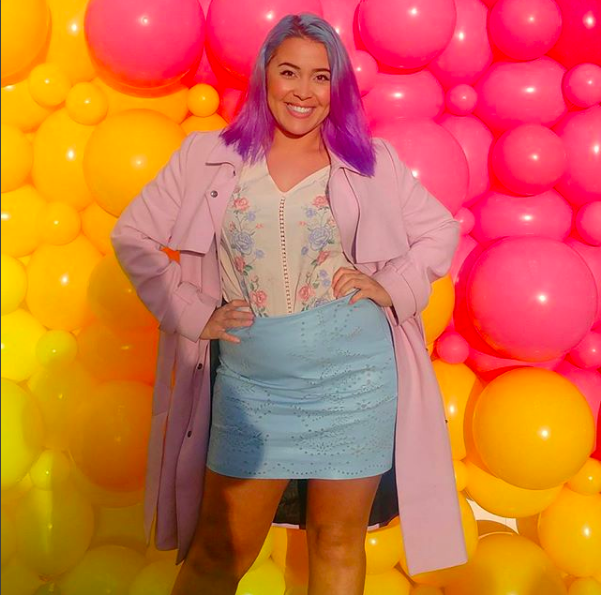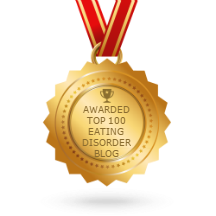- Home
- About
-
Services
- Therapy
-
Eating Disorder Trainings
>
- Clinical Approaches To Treating Body Image Issues
- Clinical Approaches To Treating Bulimia & Binge Eating Disorder
- Finding Freedom From Binge Eating
- Finding Freedom From Anorexia
- Supporting A Loved One With An Eating Disorder
- Eating Disorder Recovery Road Map
- Healing From Body Hate And Practicing Self-Compassion
- Common Questions
- Blog
- Press
- Contact
|
I am so thrilled to have gotten to interview the amazing Megan Crabbe, who runs the awesome body-positive Instagram account, Bodyposipanda, and is the author of Body Positive Power, which is available for pre-order here. I've had so many clients share that Megan's Instagram account was incredibly helpful for them in their recovery. She is a true inspiration to so many and a living example that recovery is possible. Jennifer: Tell me a little bit about your struggle with an eating disorder (please avoid numbers of graphic descriptions of behaviors, so as not to trigger my readers)/ Megan: I've had a disordered relationship with food since I was a child. It was around 10 years old that the dieting and calorie counting started, and from there spiraled into a diagnosis of anorexia nervosa at 14. It took me two years to claw my way out of anorexia - and end up right back at the cycle of restriction and binge eating that had lead me there in the first place. It wasn't until I found body positivity at 21 years old that I finally began a true recovery from disordered eating, left dieting behind and truly healed. Jennifer: What do you think was the function of your eating disorder in your life? Megan: Wow, this is a fantastic question. For me, food, exercise and the numbers they add up to were always things that I could put my anxiety into. They were vehicles for my pain, and I believed at the time that they made that pain easier to manage. If you take all of your feelings of inadequacy, of never being good enough, of feeling like you can't keep hold of your life, and channel them into a calorie count, you feel like you've regained some semblance of control. You have something tangible that promises to make everything better, something that you feel you have total power over even if everything else is making you feel powerless. The numbers gave me something to hold onto, and I held on so tight, that I never stopped to realize they were also destroying me. Jennifer: Was there a turning point for you, where you really started to embrace the idea of recovery? Megan: I always say that my major turning point was seeing my dad cry for the first time in my life. It's a strange thing when you're that deep in the anorexia mindset, most of your thinking is entirely distorted by the eating disordered part of your brain, but every so often you get these sharp flashes of reality. Moments when you realise the magnitude of what you've done, or what the eating disorder has done to you. 9/10 times the eating disorder will overpower those glimpses of reality and convince you they're false, the turning point comes when a glimpse of reality is bright enough to break through, overpower the ED voice, and remind you that there is a real life out there worth fighting for. Not wanting to ever see the people I love in that much pain again was a bright enough flash for me to start the fight. Jennifer: What helped you get through the tough times in recovery? Megan: My dad. He was basically my therapist, my biggest cheerleader, my shoulder to cry on. I'm incredibly blessed to have had someone in my life who was never willing to give up on me, even when he was told that he probably should. Jennifer: What were some of your motivations in terms of pushing yourself in recovery? Megan: Anger was my biggest motivator. Anger towards my eating disorder for taking so much of my life from me and hurting everyone around me. It was anger that fueled the first bite of food and anger that pushed me to take every bite after that. I rose up and fucking refused to spend another day of my life listening to that voice because all it had ever done was destroy everything it got hold of. And I genuinely believe that every single person reading this who's struggling right now has that anger inside them as well. We have so much more power than we realise. Jennifer: What was the most helpful for you in terms of your recovery (i.e. specific skills, tools, treatment etc)? Megan: My actual treatment was kind of a shambles, this was 10 years ago and NHS (UK) mental health services were even worse than they are now. I relied massively on the support of my family, and further down the road, of my friends. One of the most helpful things for me was spending time with people who loved food. Who had never had a disordered relationship with it, who felt no shame in ordering dessert or having a second helping if they wanted it. My friend Sian became my after school snack time buddy and simply being around someone who enjoyed food unapologetically, didn't care about calories and was for most part comfortable in her own skin, was exactly what I needed at that time. Jennifer: How is your life in recovery (or recovered) different from your life in an eating disorder? What would you say are some of the benefits of being recovered? Megan: My life now is a life that I never believed I would get to live. It's a life where I'm mentally free enough to focus on all of the parts of myself that I never knew were there because they were obscured by the numbers. It's a life where I can thrive and grow and explore and find joy in the world because shrinking my body is no longer on my list of priorities. It's a life where I barely even think about food until my stomach tells me that I'm hungry, then I enjoy it, no longer even think about the numbers, and go about my day. It's living. The kind of living that staying trapped in my eating disorder never would have allowed me. Jennifer: What are some of your favorite recovery resources? (i.e. books, articles, podcasts, etc). Megan: Some books that were real game-changers for me are The Beauty Myth by Naomi Wolf, Fat! So? by Marilyn Wann, Losing It by Laura Fraser, and there are so many more. Online some of my favorite recovery and body positive accounts are @iamdaniadrianna @gracefvictory @dothehotpants @the_feeding_of_the_fox and @scarrednotscared Jennifer Rollin, MSW, LCSW-C: is an eating disorder therapist in private practice in Rockville, Maryland. Jennifer specializes in helping teens and adults struggling with anorexia, binge eating disorder, and bulimia, and body image issues. Jennifer provides eating disorder therapy in Rockville, MD, easily accessible to individuals in Potomac, North Potomac, Bethesda, Olney, Germantown, and Washington D.C. Connect with Jennifer through her website: www.jenniferrollin.com Check out Jennifer's on-demand eating disorder trainings here!
0 Comments
Leave a Reply. |
About MeI'm an eating disorder therapist in private practice in Rockville, MD. Archives
June 2024
|


 RSS Feed
RSS Feed
